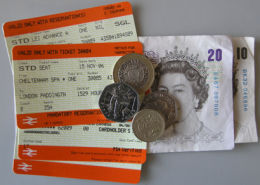Posted 20th December 2011 | 8 Comments
2012 rail fare rise is 5.9% after government rethink

TRAIN OPERATORS say rail fares will rise by an average of 5.9 per cent next month, which is about 2 per cent less than had been expected before the Chancellor's Autumn Spending Statement.
The formula which had been used for some years was the annual increase in the Retail Price Index, as recorded in July, plus 1 per cent, which was designed to achieve a modest but steady rise in the real terms cost of travelling by rail and reduce the contribution needed from taxpayers.
But after last year's election, incoming transport secretary Philip Hammond said the rises for the next three years, starting in 2012, would have to be sharper, and he changed the formula to RPI + 3 per cent.
This would have meant rises in the region of 8 per cent next month, but the Chancellor performed a u-turn in his Autumn Spending Statement at the end of November, and restored the old RPI + 1 per cent formula for 2012 at least. He also scrapped a planned rise in road fuel duty.
However, Mr Hammond had also restored the 'flex', which allows operators to adjust regulated fares, which include most of those paid by commuters, by up to 5 per cent either way. The Chancellor left the flex alone.
Although some fares may change by more or less than 5.9 per cent next month as a result, each franchised operator must achieve the official average over a 'basket' of its fares.
The official formula does not affect discounted Advance fares, or those charged by open access operators, which remain at the operators' discretion.
Operators have had a busy few weeks since the Chancellor made his announcement, because fares had to recalculated to match the restored RPI + 1 per cent rule.
The chief executive of the Association of Train Operating Companies, Michael Roberts, pointed out that there was a continuing drive to reduce railway costs.
He said: "The long-standing government approach to sustaining rail investment is to cut the contribution from taxpayers and increase the share paid for by passengers.
“The industry is working together to continue cutting costs as a way to help limit future fare rises and offer better value for money for taxpayers over the longer term."
Reader Comments:
Views expressed in submitted comments are that of the author, and not necessarily shared by Railnews.

Joel Kosminsky, London, Britain
Beware 'averages', the politician's ally. There are three 'averages', which one is the government, ATOC and TOCs using, let alone whether they're using the same one - 'mean', 'median' or 'mode'? My analysis shows the rises are penalising captive season ticket markets, using the basket of all fares to hide it. Fares go up by RPI-PLUS while incomes are frozen, have minimal rises or limited to CPI; this is dishonourable and deceitful.
Tom K, Manchester
Meic Batten - Isn't that the point..? To avoid tax payers paying for the rail industry.. So rail users wouldn't be paying twice?!!
I'm not saying I agree with it. However, I think we'd all agree that the rail industry needs an overhaul. Keeping a industry/business running in a model that was created more then 10 years ago does not work and that industry/business goes bust..
Lee, Manchester
Will the governemt also be cutting tax payers subsidy to airlines, particulalry the budget airlines? Why not tlet the passengers who use air travel pick up more of the price tag in a similar way the governmet wants to implement on rail passengers?
Will this policy also be applied to HS2? I doubt I will get to use it all that much, especially the proposed first section between London and Birmingham. Why should I therefore subsidise its construction through my tax payments? Either the government subsidises rail or it dosen't. It shouldn't pick and choose which bits it wants to invest in and expect the consumer to pick up the rest of the bill along with ever increasing taxation.
Melvyn Windebank, Canvey Island, Essex, England
Tories ALWAYS use divide and rule regarding taxpayers and farepayers and most of those who vote for them fall for it and then moan about fare rises and subsidies.
And yet when it comes to roads no mention is made of subsidies which somehow becomes investment in roads well its time roads were made equal with rail with the Highways Agency set up like Network Rail with a remit to raise funds to invest in roads. Over time fuel duty can be replaced by toll charges and C-Zones to fund roads with the same percentage of taxpayer support as rail gets!!
We should start by linking fares with fuel duty when it comes to increases!!
barry, croydon, uk
until we have not for profit train companies fares will go on rising far too much in the uk.
Meic Batten, Maesteg, Wales
"The long-standing government approach to sustaining rail investment is to cut the contribution from taxpayers and increase the share paid for by passengers.
So rail users have to pay twice then. We are taxpayers too.
Meic Batten, Maesteg, Wales
“The industry is working together to continue cutting costs as a way to help limit future fare rises and offer better value for money for taxpayers over the longer term."
I am sick and tired of hearing this. People who buy train tickets are taxpayers too or hasn't anyone noticed.
Rob, West Yorkshire
Fares shouldn't be going up at all! 5.9% is still a lot of money. Pay more to stand up on unreliable, dirty trains with down-graded or no catering. It is an insult.